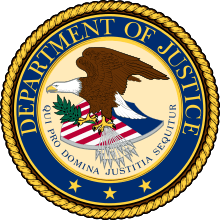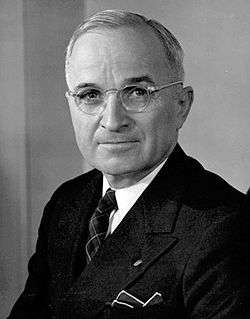J. Howard McGrath
| J. Howard McGrath | |
|---|---|
 | |
| 60th United States Attorney General | |
|
In office July 27, 1949 – April 3, 1952 | |
| President | Harry S. Truman |
| Preceded by | Tom C. Clark |
| Succeeded by | James P. McGranery |
| United States Senator from Rhode Island | |
|
In office January 3, 1947 – August 23, 1949 | |
| Preceded by | Peter G. Gerry |
| Succeeded by | Edward L. Leahy |
| 60th Governor of Rhode Island | |
|
In office January 7, 1941 – October 6, 1945 | |
| Lieutenant | Louis W. Cappelli |
| Preceded by | William Henry Vanderbilt III |
| Succeeded by | John O. Pastore |
| Personal details | |
| Born |
James Howard McGrath November 28, 1903 Woonsocket, Rhode Island, U.S. |
| Died |
September 2, 1966 (aged 62) Narragansett, Rhode Island |
| Resting place | St. Francis Cemetery, Pawtucket, Rhode Island, U.S. |
| Political party | Democratic |
| Spouse(s) | Estelle Cadorette McGrath |
| Children | James David "Mark" McGrath |
| Alma mater |
Providence College Boston University |
| Religion | Roman Catholic |
James Howard McGrath (November 28, 1903 – September 2, 1966) was an American politician and attorney from the U.S. state of Rhode Island. McGrath, a Democrat, served as U.S. Attorney for Rhode Island before becoming Governor, U.S. Solicitor General, U.S. Senator, chairman of the Democratic National Committee, and Attorney General of the United States.
Biography
Born in Woonsocket, Rhode Island. McGrath was the son of James J. McGrath and the former Ida E. May. He graduated from the La Salle Academy in 1922, attended Providence College, and went to the Boston University Law School in 1929. McGrath married Estelle A. Cadorette on November 28, 1929. They adopted a son.
From 1930 to 1934, he was the city solicitor of Central Falls, Rhode Island. During this time he was also interested in the real estate, insurance, and banking industries. He served as United States Attorney for the District of Rhode Island from 1934 to 1940.
From 1941 until 1945, he was Governor of Rhode Island, reorganizing the juvenile court system while sponsoring a workers' compensation fund and a labor relations board, but he resigned in the middle of his third term to accept appointment as Solicitor General of the United States (1945–1946). As Governor, McGrath presided over a limited-purpose state constitutional convention in 1944.[1] McGrath was elected as a Democrat to the United States Senate from Rhode Island in 1946 to join a Congress (the Eightieth, 1947 to 1949), where the opposition Republican Party had just replaced Democratic majorities in both houses. (See United States elections, 1946.)
He was briefly chairman of the U.S. Senate Committee on the District of Columbia for the 81st Congress (to which the 1948 election had returned Democratic majorities). In the Senate, McGrath opposed reducing wartime economic controls and taxes, wishing to spend the latter instead on Social Security, national health insurance, and education.[2]

He was chairman of the Democratic National Committee from 1947 to 1949. In managing President Harry Truman's successful 1948 election campaign, McGrath alienated white Southerners but won over crucial black constituencies by integrating the Democratic national headquarters staff.[2]
President Truman appointed Sen. McGrath Attorney General of the United States on August 24, 1949. He resigned on April 3, 1952, after he had refused to cooperate in a corruption investigation initiated by his own department. Truman asked for and received McGrath's resignation.[3]
Alternative accounts have contradictorily suggested that after a meeting of the Joint Chiefs of Staff at Truman's "Little White House" in Key West, the Secretary of the Navy, along with other members, had threatened to resign if they, too, were forced to comply with Special Assistant Attorney General Newbold Morris's request for the personal records of all those members who might have received gifts under the scope of the corruption investigation. Under pressure to follow through with the Justice Department corruption investigation, along with the threats of resignation, McGrath agreed that Morris's request was asking too much and that the best thing to do at that point was to clean up the department from that point forward and leave the past alone. Truman had been backed into a corner and the only way out was to ask for McGrath's resignation. This account was corroborated by a letter from Truman to McGrath, which hung in the hallway of McGrath's summer home from the Narragansett, Rhode Island into up from a time of his death in 1966.
McGrath entered the private practice of law in Washington, D.C. and Providence. In 1960, he was an unsuccessful candidate to succeed the retiring U.S. Sen. Theodore Francis Green (Democrat of Rhode Island), losing the Democratic primary (also contested by former Governor Dennis J. Roberts) to Claiborne Pell.
McGrath died of a heart attack in Narragansett, Rhode Island on September 2, 1966, at the age of 62. He was buried at the St. Francis Cemetery in Pawtucket, Rhode Island.
There is a bust of Senator McGrath outside the House chamber in the Rhode Island State House.
Notes
- ↑ Records Relating to Constitutional Convention (1944), at the Rhode Island State Archives, Rhode Island Secretary of State's Office (retrieved May 2, 2014):
"...convention convened at the Rhode Island College of Education auditorium in Providence, March 28, 1944 for the purpose of amending the State constitution to eliminate voting registration requirements by members of the armed forces, merchant marines or persons absent from the state performing services connecting with military operations. Delegate continent totaled 200 with Governor J. Howard McGrath serving as president & William A. Needham of Providence as Secretary. Proposal put before the voters at a special election held April 11, 1944. Amendment passed with 7,122 voting for & 119 against."
- 1 2 "J. Howard McGrath" in West's Encyclopedia of American Law (1998)
- ↑ Marcus, Truman and the Steel Seizure Case: The Limits of Presidential Power, 1977, p. 35-36.
References
- "J. Howard McGrath, Ex-Attorney General, Dies." New York Times. September 3, 1966.
- Levieros, Anthony. "Upsets Come Fast; Resignation of McGrath Follows Quickly His Ousting of Morris." New York Times. April 4, 1952.
- Marcus, Maeva. Truman and the Steel Seizure Case: The Limits of Presidential Power. New York: Columbia University Press, 1977. ISBN 0-231-04126-8
- West's Encycylopedia of American Law provides more details than the other sources, especially about McGrath's early life, his commitment to civil rights and the financial scandals that touched him.
External links
| Wikimedia Commons has media related to James Howard McGrath. |
| Political offices | ||
|---|---|---|
| Preceded by William H. Vanderbilt |
Governor of Rhode Island 1941–1945 |
Succeeded by John O. Pastore |
| United States Senate | ||
| Preceded by Peter G. Gerry |
U.S. Senator (Class 1) from Rhode Island 1947–1949 Served alongside: Theodore F. Green |
Succeeded by Edward L. Leahy |
| Legal offices | ||
| Preceded by Charles H. Fahy |
Solicitor General 1945–1946 |
Succeeded by Philip B. Perlman |
| Preceded by Tom C. Clark |
U.S. Attorney General Served under: Harry S. Truman 1949–1952 |
Succeeded by James P. McGranery |



